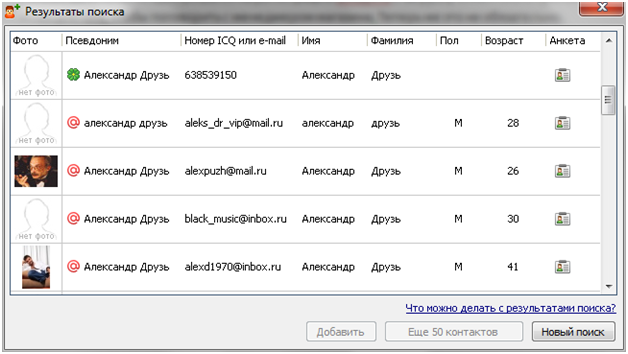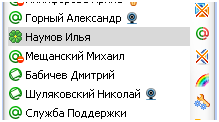Mail.Ru Agent + ICQ = interoperability
The projects Mail.Ru Agent and ICQ have a big event - we launched a server transport that gives users of both networks the opportunity to communicate with each other. In other words, the notorious interoperability or peering that advanced messenger users have been talking about for so long has finally happened!

What does this mean for the user?
Very simple.
Users of Mail.Ru Agent can add ICQ users to their contact lists (and, of course, exchange messages with them). However, having an ICQ account is optional.
The same principle works in the opposite direction - ICQ users can add Mail.Ru Agent users to their existing contact list.
For simplicity, we will consider the interaction of the two networks using the example of the Mail.Ru Agent, although this works in exactly the same way in ICQ clients.
When searching for a contact by name, it’s now no longer necessary to think about which messenger this person is using - the search is automatically performed immediately in both networks.

I already use Mail.Ru Agent as an ICQ client. What to do? ?
Nothing special. In Mail.Ru Agent, you can still configure your ICQ account and decide for yourself which account (Mail.Ru Agent or ICQ) to add another ICQ contact to. It's hard to believe or even just understand, but adding contacts from the Agent to the ICQ account in the Agent also works! ;)
How is this technically implemented?
One of the key tasks set for the developers was to ensure backward compatibility with old clients (both Mail.Ru Agent and ICQ). The new functionality is implemented on the server side, so communication with users added from another network is possible in almost all versions of Mail.Ru Agent and ICQ, including old ones. But in order to make a better impression of the service, it is better to update client applications.
Mail.Ru Agent clients still connect to their servers through their own protocol, ICQ clients do the same. Clients of the Mail.Ru Agent "see" ICQ contacts in the format 12345@uin.icq, ICQ clients - in the form of a regular e-mail address.
Thus, neatly written client applications (expecting a string rather than a number as a UIN) do not notice any changes at all, and work correctly with the new type of contacts right out of the box.
The main "magic" occurs between the servers. We have developed a special interface between the Mail.Ru Agent and ICQ servers (based on the SIP / SIMPLE protocol), within the framework of which data is transferred from one protocol to another and vice versa.
Only “cosmetic” work was done in the clients - for example, ICQ-contacts in the Agent's Mail.Ru contact list were visually highlighted (indicated by “flowers”), texts and tips were updated, etc.

So far, only the most basic capabilities of both protocols are supported: sending a message, request / confirmation of authorization, searching for contacts, presense statuses, requesting a profile. However, in the future, depending on the popularity of peering, we plan to support most of the popular functions, including file transfer, voice and video calls, etc.
Please also note that we are still testing our server and fixing errors, therefore interoperability is guaranteed only on the official clients of Mail.Ru Agents and ICQ. And, of course, we, as always, will be grateful to you for bug reports.
Download official clients for PC here:
Why support two different client-server protocols?
The question is fair - at first glance, it is easier to transfer the Mail.Ru Agent and ICQ clients to a single protocol than to support two types of servers with a layer between them. However, the reason for this "zoo" is very prosaic - backward compatibility. The audience of both networks is tens of millions of users per day, and all of them use clients of various versions. Unfortunately, desktop or mobile platforms are not the web, and instantly updating all client applications on user devices is simply not possible. This problem is especially acute for the ICQ network, in which a significant part of the customers are non-native clients.
Therefore, despite our strategic readiness to switch both products to one single technology, we, unfortunately, will have to support two different protocols for quite some time. Nevertheless, we are already taking certain steps towards unification.
Who will benefit from interoperability?
Given that the audience of the Mail.Ru Agent and ICQ is approximately comparable, we expect that the synergy will benefit both networks. In general, we believe that artificial barriers in the field of personal communications have long outlived themselves, so the more users of various services can communicate with each other, the better it will be for everyone.
Ilya Naumov,
Project Manager Mail.Ru Agent

What does this mean for the user?
Very simple.
Users of Mail.Ru Agent can add ICQ users to their contact lists (and, of course, exchange messages with them). However, having an ICQ account is optional.
The same principle works in the opposite direction - ICQ users can add Mail.Ru Agent users to their existing contact list.
For simplicity, we will consider the interaction of the two networks using the example of the Mail.Ru Agent, although this works in exactly the same way in ICQ clients.
When searching for a contact by name, it’s now no longer necessary to think about which messenger this person is using - the search is automatically performed immediately in both networks.

I already use Mail.Ru Agent as an ICQ client. What to do? ?
Nothing special. In Mail.Ru Agent, you can still configure your ICQ account and decide for yourself which account (Mail.Ru Agent or ICQ) to add another ICQ contact to. It's hard to believe or even just understand, but adding contacts from the Agent to the ICQ account in the Agent also works! ;)
How is this technically implemented?
One of the key tasks set for the developers was to ensure backward compatibility with old clients (both Mail.Ru Agent and ICQ). The new functionality is implemented on the server side, so communication with users added from another network is possible in almost all versions of Mail.Ru Agent and ICQ, including old ones. But in order to make a better impression of the service, it is better to update client applications.
Mail.Ru Agent clients still connect to their servers through their own protocol, ICQ clients do the same. Clients of the Mail.Ru Agent "see" ICQ contacts in the format 12345@uin.icq, ICQ clients - in the form of a regular e-mail address.
Thus, neatly written client applications (expecting a string rather than a number as a UIN) do not notice any changes at all, and work correctly with the new type of contacts right out of the box.
The main "magic" occurs between the servers. We have developed a special interface between the Mail.Ru Agent and ICQ servers (based on the SIP / SIMPLE protocol), within the framework of which data is transferred from one protocol to another and vice versa.
Only “cosmetic” work was done in the clients - for example, ICQ-contacts in the Agent's Mail.Ru contact list were visually highlighted (indicated by “flowers”), texts and tips were updated, etc.

So far, only the most basic capabilities of both protocols are supported: sending a message, request / confirmation of authorization, searching for contacts, presense statuses, requesting a profile. However, in the future, depending on the popularity of peering, we plan to support most of the popular functions, including file transfer, voice and video calls, etc.
Please also note that we are still testing our server and fixing errors, therefore interoperability is guaranteed only on the official clients of Mail.Ru Agents and ICQ. And, of course, we, as always, will be grateful to you for bug reports.
Download official clients for PC here:
Why support two different client-server protocols?
The question is fair - at first glance, it is easier to transfer the Mail.Ru Agent and ICQ clients to a single protocol than to support two types of servers with a layer between them. However, the reason for this "zoo" is very prosaic - backward compatibility. The audience of both networks is tens of millions of users per day, and all of them use clients of various versions. Unfortunately, desktop or mobile platforms are not the web, and instantly updating all client applications on user devices is simply not possible. This problem is especially acute for the ICQ network, in which a significant part of the customers are non-native clients.
Therefore, despite our strategic readiness to switch both products to one single technology, we, unfortunately, will have to support two different protocols for quite some time. Nevertheless, we are already taking certain steps towards unification.
Who will benefit from interoperability?
Given that the audience of the Mail.Ru Agent and ICQ is approximately comparable, we expect that the synergy will benefit both networks. In general, we believe that artificial barriers in the field of personal communications have long outlived themselves, so the more users of various services can communicate with each other, the better it will be for everyone.
Ilya Naumov,
Project Manager Mail.Ru Agent
